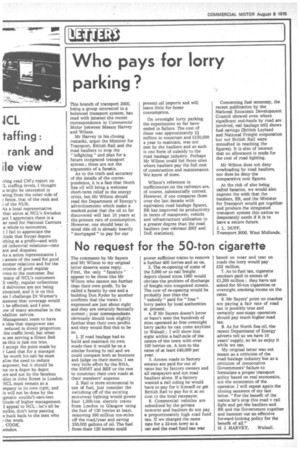Who pays for lorry parking?
Page 34

If you've noticed an error in this article please click here to report it so we can fix it.
This branch of transport 2000, being a group interested in a balanced transport system, has read with interest the recent correspondence in Commercial Motor between Messrs Harvey and Wilson.
Mr Harvey in his closing remarks, urges the Minister for Transport, British Rail and the road hauliers to stop the " infighting " and plan for a future integrated transport system ; these are not the arguments of a fanatic.
As to the truth and accuracy of the details of the correspondence, it is a face that North Sea oil will bring a welcome short-term relief in the energy crisis, but .Mr Wilson should read the Department of Energy's advertisements which make a marked point that the oil so far discovered will last 10 years at the present rate of consumption. However, one should bear in mind this oil is already heavily " mortgaged " to pay for our present oil imports and will leave little for home consumption.
On overnight lorry parking the experiments so far have ended in failure. The cost of these was approximately £e million to construct and £150,000 a year to maintain, was not met by the hauliers and as such is one form of subsidy to the road haulage industry. Perhaps Mr Wilson could list those sites where hauliers pay the full cost of construction and maintenance. We know of none.
Wilson's reference to inefficiencies on the railways are, of course, substantially correct. However, if one compares them over the last decade with equivalent road haulage figures, BR has improved its productivity in terms of manpower, vehicle and infrastructure utilisation to a greater degree than the road hauliers (see relevant BRF and DoE statistics). Concerning fuel economy, the recent publication by the National Economic Development Council showed even where significant end-hauls by road are involved, rail haulage still shows fuel savings (British Leyland and National Freight corporation but not British Rail were consulted in reaching the figures). It is also of interest that no allowance is made for the cost of road lighting.
Mr Wilson does not deny oveeloading by road hauliers, nor does he deny the comparative cost figures.
At the risk of also being called fanatics, we would also express the wish that the hauliers, BR, and the Minister for Transport would get together and produce the integrated transport system this nation so desperately needs if it is to have a secure future.
J. L. DUFF, Transport 2000, West Midlands.




































































































